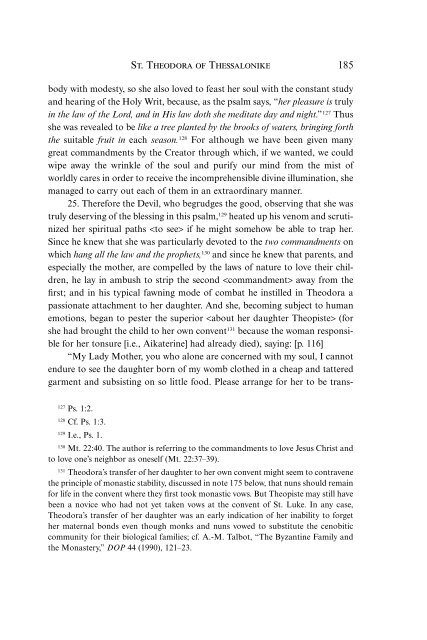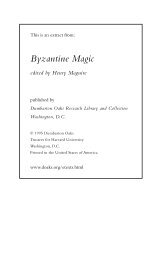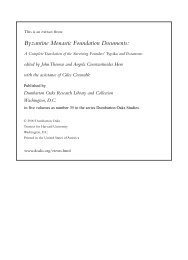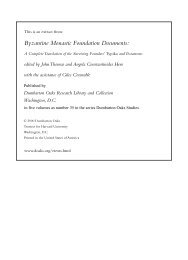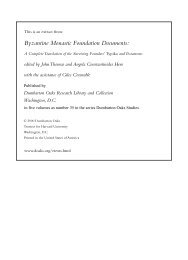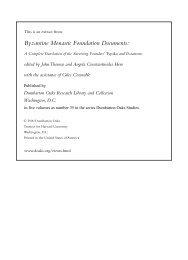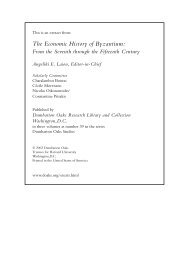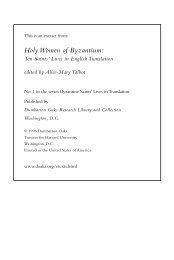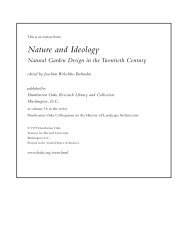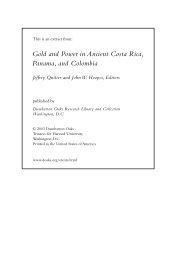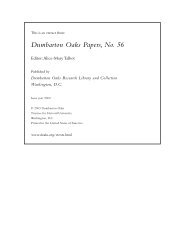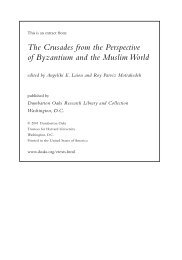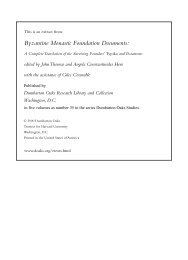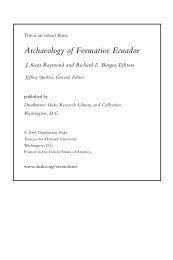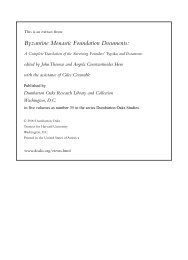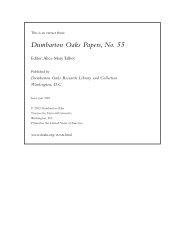7. Life of St. Theodora of Thessalonike - Dumbarton Oaks
7. Life of St. Theodora of Thessalonike - Dumbarton Oaks
7. Life of St. Theodora of Thessalonike - Dumbarton Oaks
You also want an ePaper? Increase the reach of your titles
YUMPU automatically turns print PDFs into web optimized ePapers that Google loves.
<strong>St</strong>. <strong>Theodora</strong> <strong>of</strong> <strong>Thessalonike</strong> 185<br />
body with modesty, so she also loved to feast her soul with the constant study<br />
and hearing <strong>of</strong> the Holy Writ, because, as the psalm says, “her pleasure is truly<br />
in the law <strong>of</strong> the Lord, and in His law doth she meditate day and night.” 127 Thus<br />
she was revealed to be like a tree planted by the brooks <strong>of</strong> waters, bringing forth<br />
the suitable fruit in each season. 128 For although we have been given many<br />
great commandments by the Creator through which, if we wanted, we could<br />
wipe away the wrinkle <strong>of</strong> the soul and purify our mind from the mist <strong>of</strong><br />
worldly cares in order to receive the incomprehensible divine illumination, she<br />
managed to carry out each <strong>of</strong> them in an extraordinary manner.<br />
25. Therefore the Devil, who begrudges the good, observing that she was<br />
truly deserving <strong>of</strong> the blessing in this psalm, 129 heated up his venom and scrutinized<br />
her spiritual paths if he might somehow be able to trap her.<br />
Since he knew that she was particularly devoted to the two commandments on<br />
which hang all the law and the prophets, 130 and since he knew that parents, and<br />
especially the mother, are compelled by the laws <strong>of</strong> nature to love their children,<br />
he lay in ambush to strip the second away from the<br />
first; and in his typical fawning mode <strong>of</strong> combat he instilled in <strong>Theodora</strong> a<br />
passionate attachment to her daughter. And she, becoming subject to human<br />
emotions, began to pester the superior (for<br />
she had brought the child to her own convent 131 because the woman responsible<br />
for her tonsure [i.e., Aikaterine] had already died), saying: [p. 116]<br />
“My Lady Mother, you who alone are concerned with my soul, I cannot<br />
endure to see the daughter born <strong>of</strong> my womb clothed in a cheap and tattered<br />
garment and subsisting on so little food. Please arrange for her to be trans-<br />
127 Ps. 1:2.<br />
128 Cf. Ps. 1:3.<br />
129 I.e., Ps. 1.<br />
130 Mt. 22:40. The author is referring to the commandments to love Jesus Christ and<br />
to love one’s neighbor as oneself (Mt. 22:37–39).<br />
131 <strong>Theodora</strong>’s transfer <strong>of</strong> her daughter to her own convent might seem to contravene<br />
the principle <strong>of</strong> monastic stability, discussed in note 175 below, that nuns should remain<br />
for life in the convent where they first took monastic vows. But Theopiste may still have<br />
been a novice who had not yet taken vows at the convent <strong>of</strong> <strong>St</strong>. Luke. In any case,<br />
<strong>Theodora</strong>’s transfer <strong>of</strong> her daughter was an early indication <strong>of</strong> her inability to forget<br />
her maternal bonds even though monks and nuns vowed to substitute the cenobitic<br />
community for their biological families; cf. A.-M. Talbot, “The Byzantine Family and<br />
the Monastery,” DOP 44 (1990), 121–23.


